Md. Ataur Rahman Prodhan
CEO & Managing Director
Sonali Bank Limited
Once upon a time, a little schoolboy, in standard 7, went to a bank by bicycle to withdraw 50 BDT. He noticed a cashier at the spot deeply. The man, in royal appearance, was the tall and fair-skinned tone. There was much money around him, who warmly welcomed the little boy with tea and snacks and helped him receive the funds he went for. From then, after seeing the posh cashier with standard activities, the little boy started dreaming of being a Banker. Dreaming is to desire for something very new and essential for people’s life. It ensures a high level of excitement; thus, you stay highly focused on accomplishing your goals both in your personal and professional life. Therefore, anyone should be serious about dreaming big and improving the quality of their life.
Although some of our dreams have to be erased from our life for some situations, what if a person determines the purpose of his life with dreams and lives accordingly. Perhaps, you have already guessed it, but we would like to introduce him to you even though he does not need any introduction. That little boy is none other than Mr. Md. Ataur Rahman Prodhan, CEO & Managing Director of Sonali Bank Limited, an eminent person who takes challenges and flourishes to the peak of success.
Mr. Prodhan was born and grew up in a remote village in Lalmonirhat named Burimari in 1960, with an amazing and supportive family who encouraged his interest in education and quest at an early age. He is a person with a distinct vision, dynamism, commitment, and innovative ideas. Mr. Prodhan graduated with honors and completed his M.Com. in Management from the University of Dhaka in 1980 and 1981, respectively. He took part in many training programs and seminars at home and abroad.
Mr. Prodhan has a glorious banking career. He joined Sonali Bank as Financial Analyst in 1984 and rose steadily through the ranks to become the Deputy Managing Director in May 2015. During his long career, he held many important executive roles, including General Manager of Sonali Bank Local Office, which is considered to be the ultimate of corporate banking, given its sheer size and range of businesses and services. He was also CEO of Sonali Bank (UK) Limited, situated in London, from March 2012 through May 2015.
Mr. Prodhan has been CEO & Managing Director of Sonali Bank Limited since August 28, 2019. Prior to this, he was CEO & Managing Director of Rupali Bank Limited, which was preceded by his brief stint as Managing Director of Probashi Kollyan Bank.
A consummate professional, Mr. Prodhan earned laurels and appreciation from the authority all through his career for his extraordinary performances.
Mr. Prodhan is an extremely intellectual Banker, Corporate Leader, and Philanthropist. He is a Rotarian and the past president of Rotary Club, Lalmonirhat. As an Executive member of Rangpur Bivag Samity, he plays a vital role in different social activities for that region. He established a primary school (Aftab Uddin Prodhan Govt. Primary School) in the name of his father, Late Aftab Uddin Prodhan, and also a high school (Amanatullah Prodhan Secondary School) in the name of his grandfather, Late Amanatullah Prodhan.
He was elected as a member of the Senate of Dhaka University in 2018, commanding the highest ever votes in the history of the Senate Election.
Dear readers, Mr. Ataur Rahman Prodhan is a living legend, so please do not skip any word of this exclusive interview because it is undoubtedly precious, where every word matters!
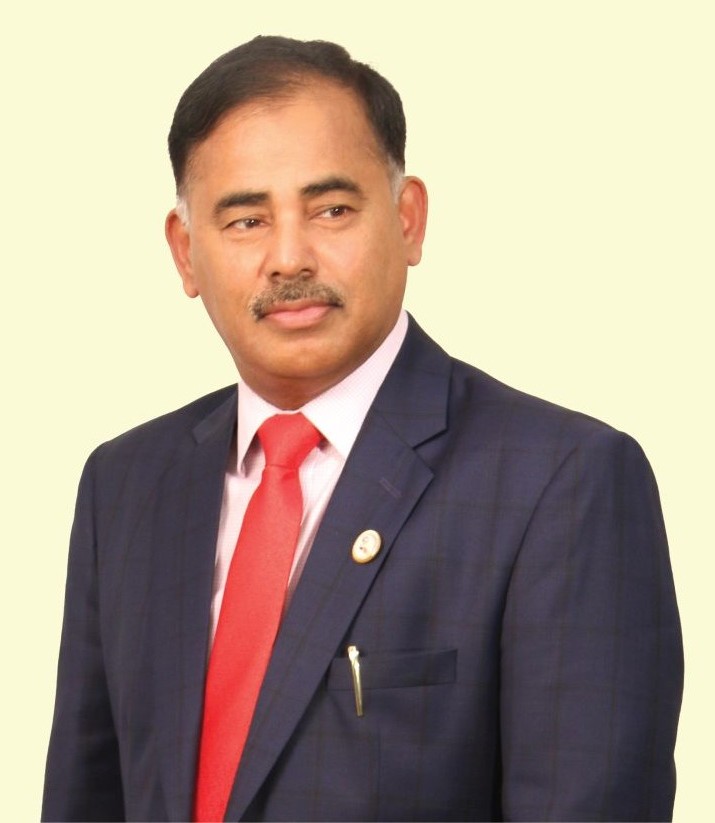
Interview With The Living Legend
Cogitation of Work
The InCAP: Mr. Prodhan, we know you commenced your career as a Financial Analyst at Sonali Bank in 1984. Did you think that one day you would work in the highest position of this organization?
Mr. Ataur Rahman Prodhan: At the time, I started my career, I never imagined being top. But I always wanted to go to a better place through my work, honesty, and dignity. I always believe success comes from working honestly. Hence, now, I am in the top position because of the recognition of my deeds. When I joined in a junior position, I dreamt of going higher and expected high. However, it was not easy to come to this long path. It would not be possible without working hard and effort.
We all know about technology in general and FinTech, in particular, changing the financial industry globally. We are interested to know about general tech adoption at Sonali Bank.
When FinTech was introduced in our country, Private Banks were going ahead. We were not that speedy; that is why we lagged behind at the beginning of the FinTech invention. But, we have given the first priority to technology and thought of utilizing technology. Now we have our own software. It’s a core banking solution of Sonali Bank, which is a joint venture with India. Even Rupali Bank has collaborated with us for this technology.
Regarding digitalization, we were thinking of taking every necessary step to reach a certain level in the next five years. Because of the coronavirus pandemic, technology has been updated more now. Our contribution regarding tech service becomes fast. By thinking of social distance at that time, we have created an application within a month for the betterment of our clients so that our clients can have banking service staying at home. Now clients need not come to the office. They can open their account at home instantly via e-KYC. Till now, millions of accounts have been opened.
Then we have thought of school and college-going students for giving them better services. Hence, we have introduced eSheba for them. Around 11 educational boards take our Sonali eSheba service for completing their fees and forms and others. It’s a huge client base.
Apart from this, foreign remittance is always our priority. Previously, it was a matter of time to credit the money worldwide. That time, it took a minimum of 72 hours and even more. Now we have started a platform for this that has been inaugurated by the Prime Minister’s ICT Affairs Adviser Sajeeb Wazed Joy. Within 5 seconds, remittance can be credited anywhere around the world around the clock. We have hired 550 dedicated IT employees to make it more successful by following the technology development. Even our IT understanding employees have taken all necessary steps of eradicating all possible IT risks. We are still working on it.
How entrepreneur-friendly is Sonali Bank? What initiatives are you conducting for entrepreneurs as of today?
The credit of becoming a successful entrepreneur-friendly depends upon the client’s satisfaction. However, it is quite difficult for the banks to ensure cent percent client satisfaction due to the diverse client base for each bank. I admit that successful banking lies in the client’s satisfaction, and that will reward us for becoming an entrepreneur-friendly country. Of all the state-owned banks, Sonali Bank is one of the banks with a significant customer base with over 20 million clients.
Sonali Bank, undoubtedly, is the largest bank among the other state-owned banks. Our Father of The Nation Bangabandhu Sheikh Mujibur Rahman named this bank as ‘Sonali Bank’, giving an inheritance of a prestigious bank in the country. In 1972, Sonali Bank started its journey when there was no private bank. At that time, all the state-owned banks, including Sonali, Rupali, Agrani, Janata, Pubali, and Uttara Bank (which was a nationalized bank), contributed to the development of the country. These banks offered aid to the agriculture industry through giving credit to serve various purposes, including but not limited to creating entrepreneurs in agriculture, agricultural science, and research, and more. The lion’s share of the agricultural development depended on the loan from these nationalized banks.
Although Henry Kissinger labeled us as a ‘Bottomless Basket’, we emerged from that position thanks to the praiseworthy contribution of these banks.
In addition, many entrepreneurs came forward and created employment and improved the lives of millions due to these banks’ leveraged role in developing the country’s economy. As a nationalized bank, Sonali Bank was no exception in this regard; instead, it participated rigorously in every step of improvement.
On another note, to describe our constant flourishment, the Malthusian Theory of Population formulated by Thomas Malthus, a British philosopher, states that food production will not be able to keep up with growth in the human population, resulting in disease, famine, war, and calamity. Bangladesh, to a great extent, proved this theory wrong by radical improvement. Not only has the population of our country increased phenomenally, but the food production is now in surplus, leading us to export some of the food items to foreign countries. The current scenario of the country shows that we’ve come through a long way from labeled slander to a developing country.
Looking back to the ’80s, most successful industrialists, investors, and even owners of bank(s) took aid from Sonali Bank. Hence, Sonali Bank takes pride in creating entrepreneurs from its birth by facilitating them with leverage financial aid. I believe that we have entrepreneurs who truly want to thrive in their sector. Of late, we’ve seen a growth in the number of entrepreneurs at our bank. They are showing interest in transferring their transaction from a private bank to our bank.
Another reason for entrepreneurs’ attention in state-owned banks is less interest rate compared to the private bank and increased facility for saving account holders. That makes us claim that we are offering the suitable service as per their necessity and also improved our services.
In addition, we have gotten rid of the conservative attitude making us more versatile and resilient despite being a state-owned bank. It is worth mentioning that our role and approaches toward our clients changed their perspective and positively impacted the client and employees simultaneously.
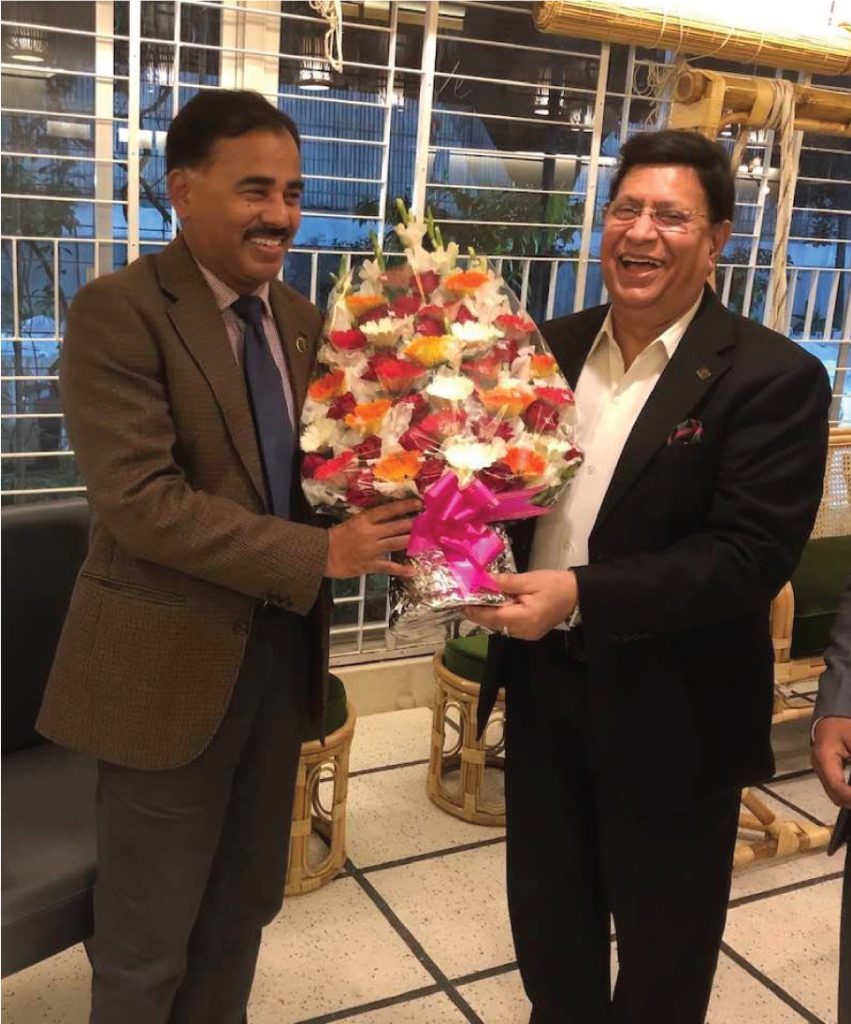
Mr. Prodhan, what are your observations on the differences in the working process, quality of service, and infrastructure of the state-owned banks and private banks in Bangladesh?
Obviously, the structure of private and state-owned banks is not the same even though banks from both streams abide by the regulations provided by Bangladesh Bank. The difference remains in terms of remaining accountable; for instance, the state-owned banks are accountable to the Ministry of Finance, whereas private banks are not. Look, we offer account opening from Tk 10 to Tk 1000+ crore because we are bound to follow the given direction from the Government.
On the other hand, the regulations for private banks in this regard are different. Being a state-owned bank, Sonali Bank is also responsible for serving beneficiaries from various safety net programs, but private banks are not entitled to do these tasks; instead, they work with a limited scale client or a particular group of clients.
In comparison to private banks, we find our satisfaction in serving our clients as we get the opportunity to serve people from different walks of life. Although our services to some extent get delayed, we have a significant client assembly compared to the private banks. In light of a particular client base, private banks are faster and efficient in offering great banking services to their clients.
Another significant difference between public and private banks is loan or credit approval. For instance, the decision regarding loans comes faster in the private banks thanks to their small approval procedure. On the other hand, public banks’ decisions regarding loans sometimes come in delay because it needs to be approved by different layers of management and authorities. As a state-owned bank, it is mandatory to go through a process before granting finance to a person or organization. However, we are constantly improving our services.
We still have a long way to go regarding customer service and satisfaction, but we are offering the services at our best even though our client base is more notable than private banks. Moreover, sometimes our services are also delayed due to such compression in serving a vast number of clients.
To celebrate the 100th birthday of Father of the Nation Bangabandhu Sheikh Mujibur Rahman, we added a slogan “Dipto shopoth mujib borshe, amra jabo sobar shirshe” (Bright oath in the year of Mujib, we will go to the top of all). We successfully kept our pledge in 2020 by achieving BDT 2,175 crore in profit, suppressing the other banks and also Sonali Bank’s history. Despite achieving such an extensive amount of profit, we still believe that we will become successful once our existing and potential clients will express their satisfaction with our services.
We are constantly improving, especially our banking digitally, and offer access to banking to remote areas. As part of our improvement in providing services, our resources are going through rigorous training and constant motivation. Apart from rewarding our employees, we also have strict rules, and that changed employees’ attitudes toward our customers to a great extent ensuring better service.
What do you think is the biggest challenge in Bangladesh’s economy in recent times?
Of all the challenges, the pandemic has become one of the greatest challenges, and it hampered our economic growth. While the COVID-19 had a tremendous negative impact on the developed countries, we stayed resilient thanks to our rural economy.
However, our country has already seen a boom in its economy due to our demographic dividend advantages. If we can adequately distribute the demographic dividend, I believe we can easily overcome the challenges. We need effective directives and guidelines which we can follow to recover the economic damages that were embraced during the pandemic.
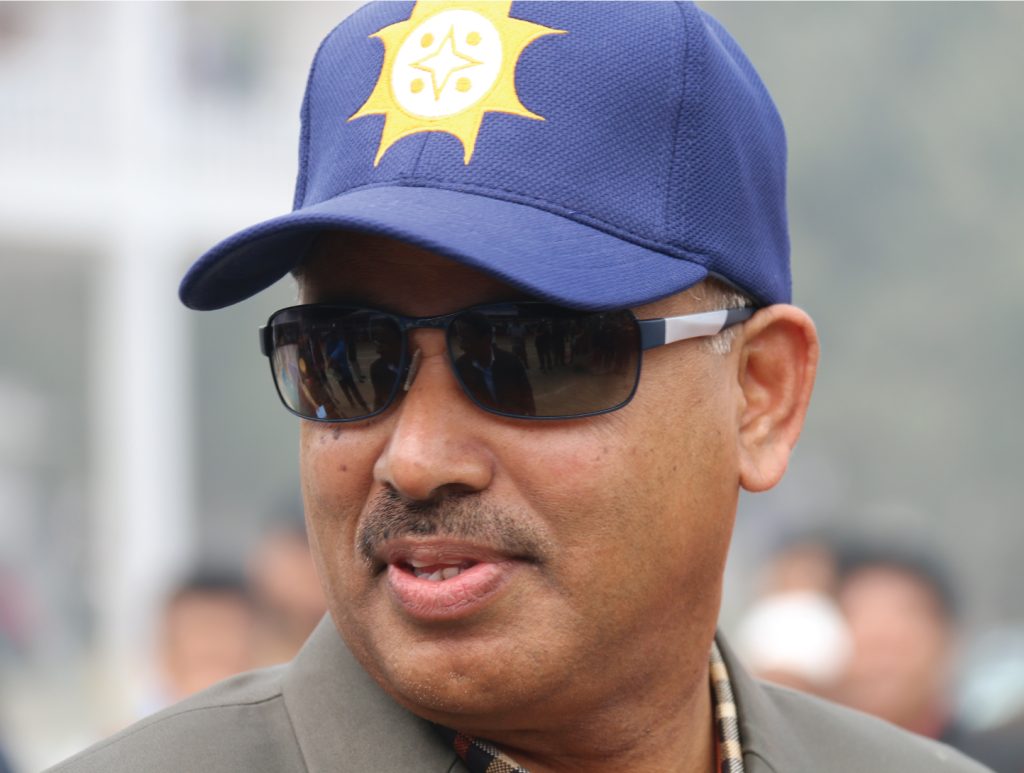
In this New Normal condition, what changes should be made in the banking sector of Bangladesh?
Of course, we have embraced a number of changes in almost all sectors, and the banking sector is no exception. However, Prime Minister Sheikh Hasina announced a significant amount of incentives to facilitate the industries and fight against the challenges of the COVID-19 pandemic. That said, the banks played an important role in terms of disbursing those amounts to the stakeholders.
Sonali Bank was a part of that initiative in helping the Government in terms of distributing to the proper stakeholder. For instance, we disbursed Tk 2000 crore in two different phases to Bangladesh Biman, which helped them to stay strong. We also gave Tk 5,400 crore to the Payra Port Authority.
I also would like to add that we are concerned about both industrial and Small and Medium-sized Enterprises (SME) clients. However, we can serve industrial clients quickly because their number is smaller than our SME client base. Therefore, it takes time to serve them instantly. Nevertheless, we are now emphasizing on serving the SMEs rightfully.
What do you think regarding MFS and Agent Banking?
Bangladesh has become a role model in Mobile Financial Services (MFS) and Agent Banking. Owing to these modules, banking has become accessible to people from all walks of life. While the other banks have already introduced MFS or agent banking, Sonali bank is no exception in this regard.
Apart from offering MFS, we have also received our license from Bangladesh Bank, and to date, we have already onboarded 400 agents. These initiatives will definitely boost our economy, and I believe that both MFS and Agent Banking nowadays have become inevitable.
What are the challenges for Sonali Bank now? What challenges do you anticipate in the future?
There were always challenges in the banking sector. The biggest challenge was our inadequate human resources, and the constant retirement of our human resources had become a constraining factor for us. In addition, recovering the classified loans was also another biggest challenge for me because our non-performing classified loan was 26%, and there was no income from that classified loan.
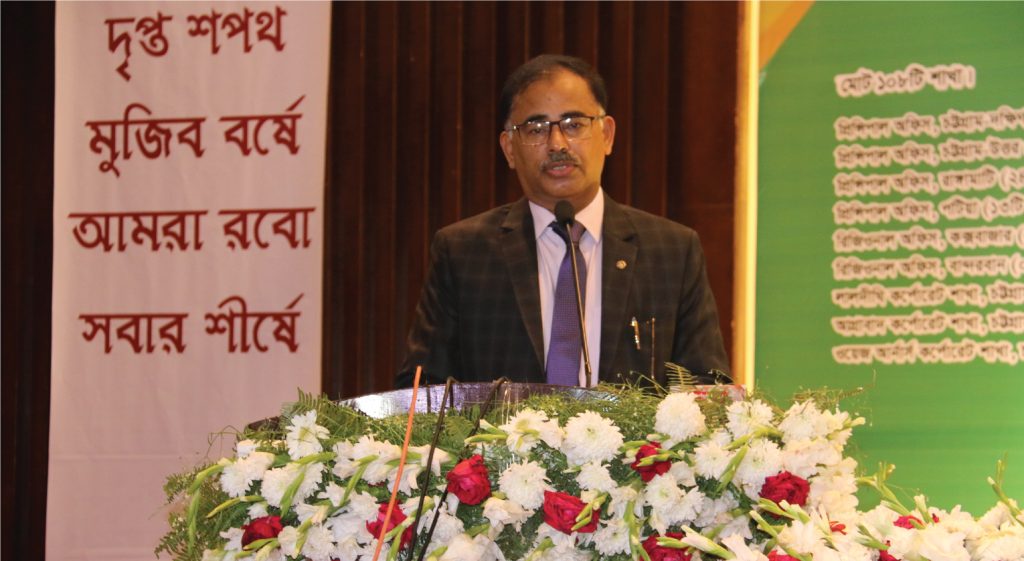
Mr. Prodhan, the banking sector is in a precarious position in defaulted loans. We want to know your experience.
To date, we employed more than 4,000 people from 2019-21, have taken several necessary steps, and are constantly motivating them to recover these classified loans.
Although we planned to bring the classified loan to a single digit, we couldn’t recover the expected recovery in the classified loans due to the pandemic. However, our various initiatives helped us overcome the challenges that we face and reached half of our targets to date.
Sonali Bank fell short of its classified credit recovery target from the top 20 defaulter organizations by a mile in 2021. What is your take on it?
In order to describe this circumstance, we need to understand that if the public banks are operating for 50 years, the private banks are operating for 25 years, half of our operation duration. In this case, the amount of classified loans would be more than the private banks. Another important factor behind such drawbacks is the lack of knowledge regarding classified loans, especially those disbursing loans to clients. For instance, even though there was a record of the loans given and recovered, most state-owned banks’ employees were not aware of the definition of classified loans.
Right after the World Bank and IMF circulated some theories related to loans, it came to the limelight to ask the stakeholder to calculate the loans given and recovered, which eventually shows a significant gap in the overall operation. If we look at the current percentage of classified loans of the state-owned banks, we can see a phenomenal decrease, and Sonali Bank is no exception.
Another constraint in recovering the classified loans is inadequate to support from legal aid. While the number of classified loans cases is increasing, the number of courts is not right to write on the legal action, also delaying the whole process.
We eagerly want to know your remark on the Digital Commerce Operation Guidelines, 2021, and the future of the e-commerce industry in Bangladesh?
Every business sector should follow the given policies by the authorities. At the time when the e-commerce business started, there was no particular policy for that. Therefore, many people exploited the condition and tried to make a fortune out of it in different ways. I sincerely appreciate the initiative taken by the Ministry of Commerce.
Undoubtedly, the e-commerce sector is one of the prospective industries. E-commerce is a huge part of the economy and is vital to businesses that sell their products or services online. E-commerce gives businesses the ability to reach more customers than traditional retail. With so many people making their purchases online, it is the fastest-growing retail market. I believe Bangladeshi e-commerce entrepreneurs will do something great and brighten the name of our nation.
You are one of the most prominent professional leaders in Bangladesh. Thousands of hearts follow you. What advice would you give to people who are just starting their careers in the banking sector?
The banking sector, without any doubt, is a sector where people can grow and build a more resilient career. Working in this sector allows an individual to serve people, and by serving people, they are indirectly serving the nation and also contributing to the economic development of the country. So I just want to say, do your work properly and honestly.
Mr. Prodhan, how would you define your long & bright professional life?
I have been CEO & Managing Director of Sonali Bank Limited since August 28, 2019. Prior to this, I was CEO & Managing Director of Rupali Bank Limited, which was preceded as Managing Director of Probashi Kollyan Bank.
However, I joined Sonali Bank as a Financial Analyst in 1984 and rose steadily through the ranks to become the Deputy Managing Director in January 2014. During this long career, I held many important executive roles, including Head of Sonali Bank Local Office, given its sheer size and range of businesses and services. I had also been CEO of Sonali Bank (UK) Limited, situated in London, from March, 2012. As a Deputy Managing Director, I held the positions of Head of HR and Head of Credit, among others; successfully, I became Managing Director of Probashi Kollyan Bank.
The journey from the junior post to my current position is really satisfactory. When it comes to defining a bright professional life, working honestly and utilizing talents are the priorities that I always mention. Being a banker is a matter of pride to me. I want to thank the Government for selecting me as the CEO of Sonali Bank Limited. Besides, the blessing of my parents and siblings, assistance from my colleagues have contributed too, that is why I am here right now. I am very much thankful to them.
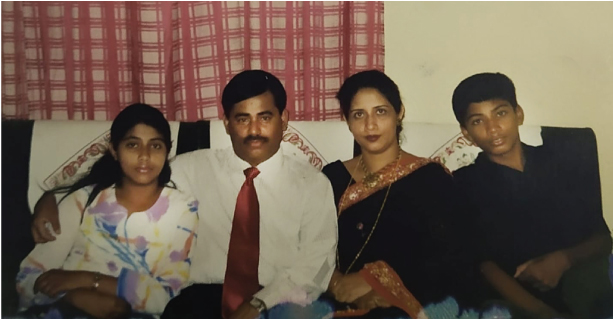
Self Portrait
Mr. Prodhan, How was your childhood and experience of growing up?
I grew up in a village named Burimari and got my primary education there. My childhood was filled with joy as I was engaged in several activities like swimming and others. I feel very nostalgic when I recall my boyhood. I wish I could go back to my childhood. I got my primary education from a school named Burimari Hasruddin High School, Lalmonirhat.
I want to spend the rest of my life there. My village is the place where I belong. My school and my village have made significant contributions to the liberation war. Freedom fighters got training at my school. I was sad for not going to fight as I was short, but my six brothers went to war. I am proud that I helped freedom fighters that time.
How has your academic life brightened you?
After completing my school life, I wanted to get admitted to Carmichael College, Rangpur, though my father desired to admit me to Gaibandha. In reality, some dreams haunt people to fulfill at any cost. So I followed the path to make my dream true. With the full support of my sisters and brothers, I got admitted to Carmichael College.
After passing the Intermediate degree in Commerce, I chose to be a Banker as my profession. I have graduated with honors and completed my M.Com. in Management from the University of Dhaka. I also took part in many training programs and seminars at home and abroad.
Mr. Prodhan, you were born in a remote village in the Lalmonirhat district in the foothills of the Himalayas. What are your plans for the local people of that village?
My school is neglected yet. I want my school to be under the patronization of the Government. However, I have established a one-storied academic building with some of my own money and social help. Hopefully, I will inaugurate the educational establishment in December this year.
I must mention that I love my village unconditionally. So far, I have worked for my village as much as I can. I want to do every possible thing for my family, society, and my villagers. After starting my banking career in 1985, I have made a little contribution for my village. There was no electricity in my village, so I have provided the electricity as I had an opportunity to create this. Due to the invention of electricity, my village’s land’s prices increased. Besides, our village mosque was made in shebang, so I took the initiative to make the mosque into a tin shed. After getting the promotion gradually, I built the largest mosque in my village too. Then, I established a school under my father’s name which is now patronized. Next, I noticed children had to visit schools which are very far, so I thought about making a high school under my grandfather’s name and I did that on my own property. Currently, around 1200 students study there. Then, I established a large madrasa under my mother’s name where orphanage students study now. I believe if a solvent and capable person helps people, then poverty will reduce in Bangladesh. Now I am planning to build a hospital where people can get free health service. I am committed to my city. I’m serving people with my best, and I will continue.
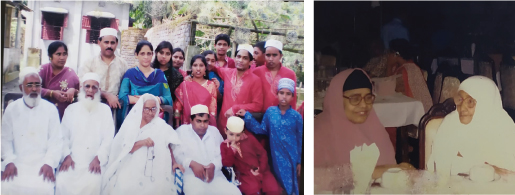
What was the influence or inspiration that shaped you and contributed to becoming the person you are today?
My inspiration is my mother and my elder sister as well. I will always be in debt to them because I cannot repay their deeds. I have established a school under my elder sister’s name. She was a school teacher at that school. So I have a total of four sisters who are like a shadow of mine. Their names are Maya, Momota, Sneho, Dulali, aren’t these names touchy?
What is your life philosophy?
I am very simple. I want to work for the people as a human being. Improving human lives is something I want to do.
What’s your plan for your motherland Bangladesh?
I grew up seeing the liberation war, Six Point Movement, listening to the slogan through radio ‘Ebarer songram shadhinotar songram, muktir shongram’ (This war is a war for independence is a war for Freedom). Now our country is independent, but we need absolute economic freedom, and I want to work on it. We have achieved this through our vision and mission from the bottomless basket to the full with basket journey in Bangladesh. But we need to improve more. We can improve entrepreneurship, artists, employment, and so on because we can improve our nation now. With a significant contribution in Bangladesh, one day Bangladesh will be a Country of Gold. It’s time for Bangladesh.

Quick Chat with Mr. Prodhan
The greatest achievement of your life as of now
My current position – CEO & Managing Director of Sonali Bank Limited
How do you define patriotism?
Working honestly
The greatest philosopher in your view
Father of the Nation Bangabandhu Sheikh Mujibur Rahman
Meaning of “Success” to you
Work, work, and work
Your Icon
Bangabandhu Sheikh Mujibur Rahman
Name the most influential books you have read
War and Peace by Leo Tolstoy
What did you want to be when you were a child?
Banker
Which is the best gift you’ve ever received?
My daughter and son
Your greatest fear
Scratch on reputation
Favorite Poet and Litterateur
Rabindranath Tagore
What motivates you?
To live with a significant contribution
Hobby
Reading books, traveling, and swimming
Best piece of advice you’ve received
Be honest at work
You in only three words
Work, Love, Advancement

















